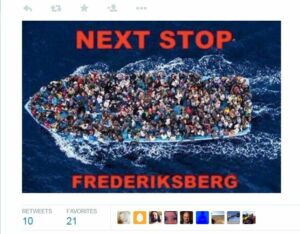Yesterday, the right-wing party Dansk Folkeparti (DF) raised eyebrows when a spokesperson proposed a new tax for adverts in English. Today, the immigrants are in their headlights.
DF’s deputy head Søren Espersen has come out and blamed the integration problems in Denmark squarely at the feet of the immigrants themselves.
“The immigrants are to blame. Those parents who don’t want to learn Danish even though they’ve been here for 20-30 years and have children who are bilingual. What is that?” Espersen told DR Nyheder.
“There is a lack of will among people who come here to get going themselves. The Danish emigrants who went to America didn’t wait for a whole bunch of people to teach them about everything and integrate them. They made an effort themselves and that is what we lack today.”
READ MORE: Danish MP proposes tax on English words in adverts
Below the belt
But DF had not finished stoking the controversial flames of integration. The party has drawn heavy fire after a local department in Frederiksberg posted a photo on Twitter of a boat crammed with refugees with the caption “Next stop Frederiksberg”.
“By far the most refugees arriving in Denmark are single young men who are placed around Frederiksberg close to schools and elderly homes and in areas where they can be problematic,” DF Frederiksberg wrote on its Facebook page.
(photo: Dansk Folkeparti Frederiksberg)
The department also wrote that it will make a map so people in Frederiksberg can see where the closest refugee lives.
The photo, minus the text, was actually taken by the AP photographer Massimo Sestini and won second prize at the 2015 World Press Photo contest.
It is not clear whether DF Frederiksberg had permission to use the photo.















